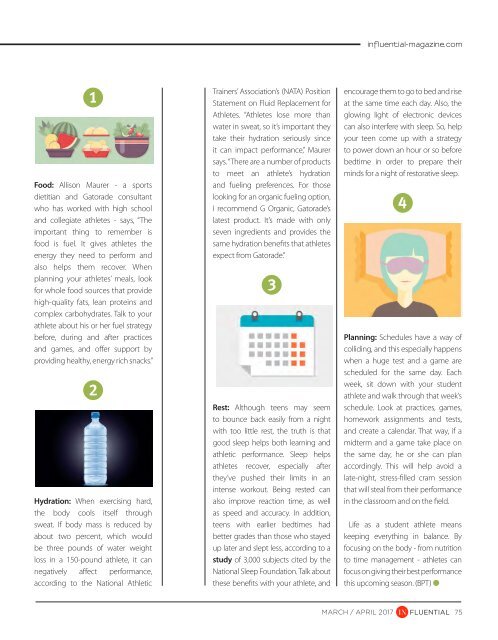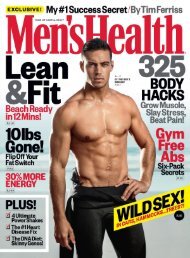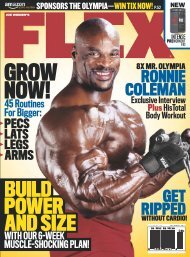InFluential_Magazine_March_April_2017
Create successful ePaper yourself
Turn your PDF publications into a flip-book with our unique Google optimized e-Paper software.
influential-magazine.com<br />
1<br />
Food: Allison Maurer - a sports<br />
dietitian and Gatorade consultant<br />
who has worked with high school<br />
and collegiate athletes - says, “The<br />
important thing to remember is<br />
food is fuel. It gives athletes the<br />
energy they need to perform and<br />
also helps them recover. When<br />
planning your athletes’ meals, look<br />
for whole food sources that provide<br />
high-quality fats, lean proteins and<br />
complex carbohydrates. Talk to your<br />
athlete about his or her fuel strategy<br />
before, during and after practices<br />
and games, and offer support by<br />
providing healthy, energy rich snacks.”<br />
2<br />
Hydration: When exercising hard,<br />
the body cools itself through<br />
sweat. If body mass is reduced by<br />
about two percent, which would<br />
be three pounds of water weight<br />
loss in a 150-pound athlete, it can<br />
negatively affect performance,<br />
according to the National Athletic<br />
Trainers’ Association’s (NATA) Position<br />
Statement on Fluid Replacement for<br />
Athletes. “Athletes lose more than<br />
water in sweat, so it’s important they<br />
take their hydration seriously since<br />
it can impact performance,” Maurer<br />
says. “There are a number of products<br />
to meet an athlete’s hydration<br />
and fueling preferences. For those<br />
looking for an organic fueling option,<br />
I recommend G Organic, Gatorade’s<br />
latest product. It’s made with only<br />
seven ingredients and provides the<br />
same hydration benefits that athletes<br />
expect from Gatorade.”<br />
3<br />
Rest: Although teens may seem<br />
to bounce back easily from a night<br />
with too little rest, the truth is that<br />
good sleep helps both learning and<br />
athletic performance. Sleep helps<br />
athletes recover, especially after<br />
they’ve pushed their limits in an<br />
intense workout. Being rested can<br />
also improve reaction time, as well<br />
as speed and accuracy. In addition,<br />
teens with earlier bedtimes had<br />
better grades than those who stayed<br />
up later and slept less, according to a<br />
study of 3,000 subjects cited by the<br />
National Sleep Foundation. Talk about<br />
these benefits with your athlete, and<br />
encourage them to go to bed and rise<br />
at the same time each day. Also, the<br />
glowing light of electronic devices<br />
can also interfere with sleep. So, help<br />
your teen come up with a strategy<br />
to power down an hour or so before<br />
bedtime in order to prepare their<br />
minds for a night of restorative sleep.<br />
4<br />
Planning: Schedules have a way of<br />
colliding, and this especially happens<br />
when a huge test and a game are<br />
scheduled for the same day. Each<br />
week, sit down with your student<br />
athlete and walk through that week’s<br />
schedule. Look at practices, games,<br />
homework assignments and tests,<br />
and create a calendar. That way, if a<br />
midterm and a game take place on<br />
the same day, he or she can plan<br />
accordingly. This will help avoid a<br />
late-night, stress-filled cram session<br />
that will steal from their performance<br />
in the classroom and on the field.<br />
Life as a student athlete means<br />
keeping everything in balance. By<br />
focusing on the body - from nutrition<br />
to time management - athletes can<br />
focus on giving their best performance<br />
this upcoming season. (BPT) l<br />
MARCH / APRIL <strong>2017</strong><br />
FLUENTIAL<br />
75


















